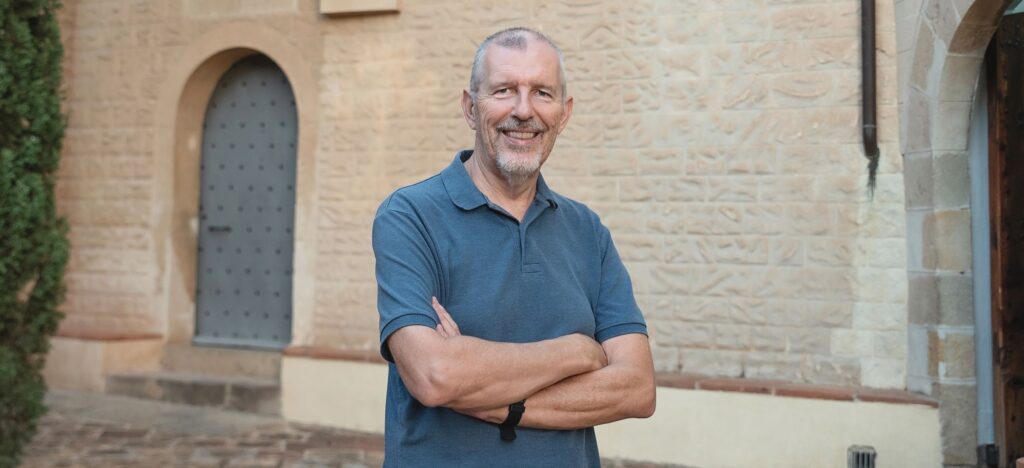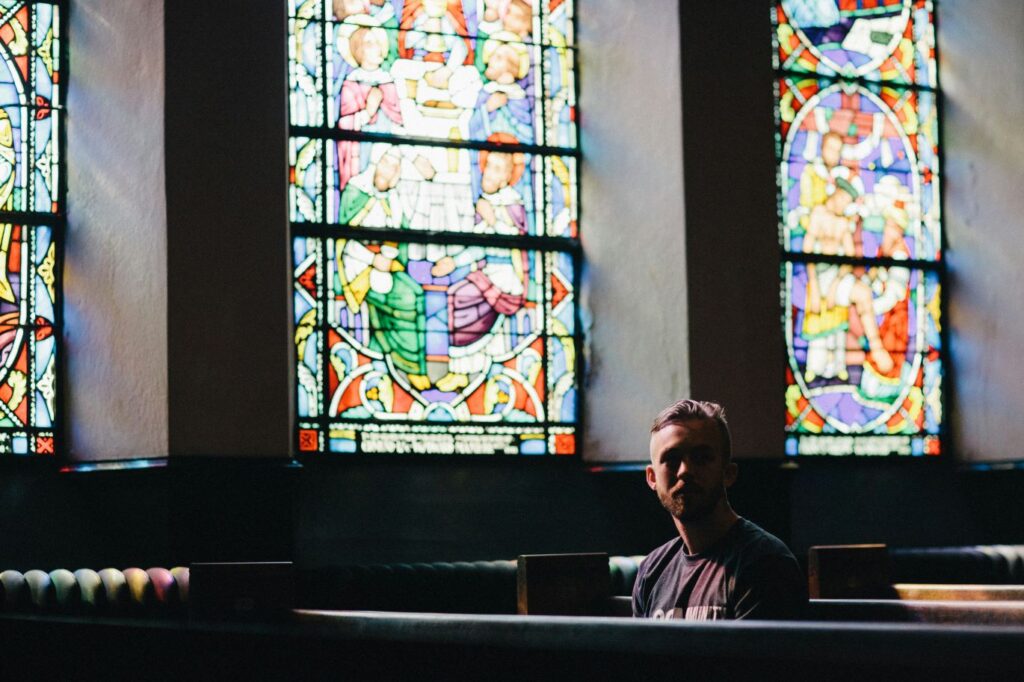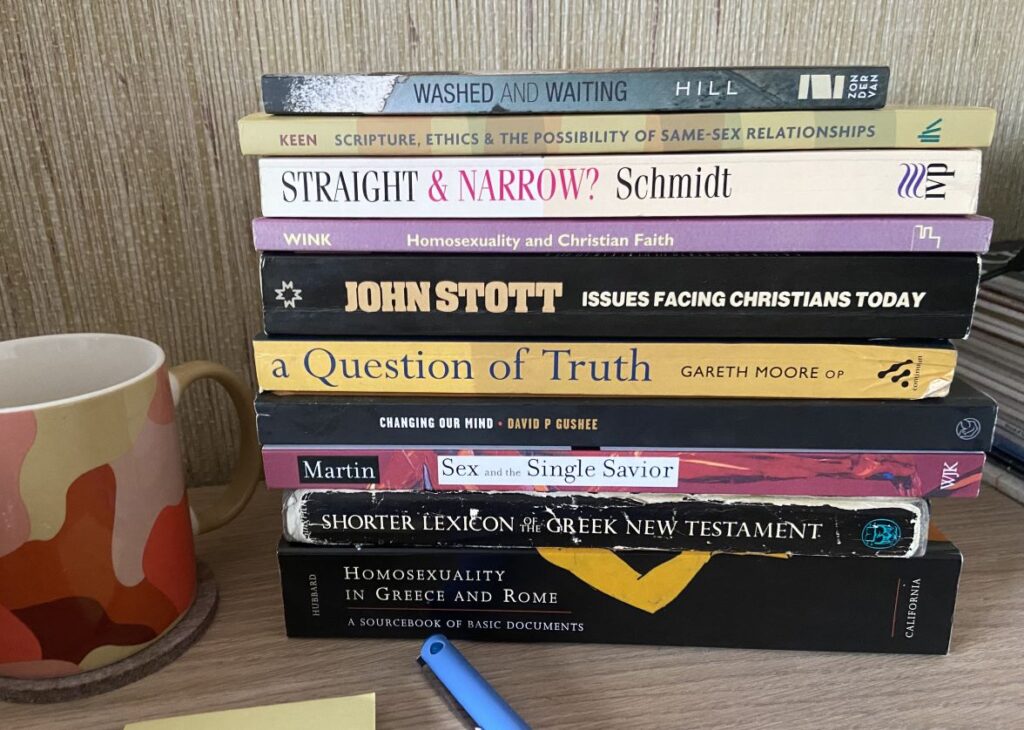Let me introduce myself
A gay family member
Heightened sensitivity towards LGBTQ+ individuals
Other ways of reading the Bible
Why I wrote a book on homosexuality
My view of gay marriage

Photo by Kelly Nash.
Let me introduce myself
I come from England but for many years I have lived in Catalonia (north-east Spain), in the Barcelona area. Here I worked for many years in a Catalan government organisation, where my job involved translating and publishing. I was recently able to take early retirement allowing me to devote more time to other projects (including this website).
I’m married, with three children and also, now, several grandchildren. I define myself as a convinced and committed Christian (disciple and follower of Jesus Christ). I have been a member of various churches, including an evangelical Anglican church, where I grew up, and then a Baptist church and a Brethren assembly in Barcelona. And for a number of years I was actively involved with the Alpha course.
A gay family member
I have a brother who is gay. Our family found out about this over thirty years ago. Because I didn’t really know what I thought about it, as a Christian, I started to read up on the subject.
In Spanish there really weren’t many Christian books on the issue of homosexuality. But in English I was able to find a fair selection. Some were pretty good, others frankly mediocre. But to start with, all the best ones (the most rigorous and convincing ones) followed the traditional viewpoint: basically that experiencing same-sex attraction is not a sin, but that the Bible clearly condemns all homosexual practice.
But nonetheless, when I thought about my brother, his place in our family and his personal history, I was uncomfortable with some of the statements in these books and their implications.
Heightened sensitivity towards LGBTQ+ individuals
Apart from purely doctrinal issues, my research has let me see that we still have a huge way to go in improving how we treat gay, lesbian, and other sexual and gender minorities.

Photo by Karl Fredrickson on Unsplash.
The books I have read are full of stories, some absolutely scandalous, of gay people being scorned, disdained, rejected and condemned. At the churches they have attended they have endured holier-than-thou attitudes, moralising and hypocrisy, often even by leaders and pastors. And even when things have not been so dire, they have struggled with a great deal of misunderstanding and insensitivity and a tremendous lack of concern for all the injustice and mistreatment suffered by sexual minorities.
There does seem to be some improvement in our churches, but progress is patchy and slow. At least these days, most Christian writers condemn violence against the LGBTQ+ community and the most obvious forms of discrimination they encounter (when renting accommodation or applying for jobs, say). Even those maintaining a traditional theological stance are deeply critical of certain homophobic attitudes: Christian parents that chuck their openly gay son or daughter out of their home, or stupid questions like “When did you decide to become gay?”.
But we are failing to offer a safe environment, of love and understanding, for non-heterosexual individuals in our churches. We mostly don’t know how to give them the support and assistance they need.
Other ways of reading the Bible
My change in perspective has not just involved a heightened sensitivity towards the LGBTQ+ community and the problems they face.
A few years ago I read the book Scripture, Ethics, and the Possibility of Same-Sex Relationships, by author Karen Keen. For me it was an eye-opener. For the first time I was faced with well-reasoned, convincing arguments, with a clear biblical basis, in favour of the “revisionist” or “affirming” viewpoint on the issue of homosexuality; that is, that God can bless a marriage between two individuals of the same sex, and that the church doesn’t need to keep gay folk out of leadership or pastoral roles.
Keen made me think hard. But for just one book, I wasn’t about to change my whole understanding of the subject. However, I carried on reading more books, both traditionalist and revisionist, and little by little the revisionist or affirming viewpoint started to gain traction in my mind.

Why I wrote a book on homosexuality
I actually never imagined myself writing a book!
But about five years ago, I was struck by a comment by author David Gushee, in chapter 3 of his book Changing Our Mind, explaining that he wasn’t the only one to have “changed his mind” about homosexuality. It struck me that I already knew most of the other Christian writers he mentioned and had read their books! Wow! Was I starting to be something of an “expert” on the subject?
I was also keenly aware that none of these books had been translated into Spanish. So the interesting arguments they presented had to be completely unknown for the vast majority of Christians in Spain and Latin America. Then I thought that, maybe, I could write an article on the subject, outlining how there could be biblical justification for an affirming stance on the issue of homosexuality.
The article got longer and longer. It was turning into a booklet, o perhaps an essay. But I still had much more to explain. While I was at it, the Covid pandemic hit, and I became convinced that I could, and should, write a whole book on the subject. Which is what I did.
I’m pleased with the result because people in the know have assured me that there truly is no other book currently available in Spanish that offers as much information on both of the viewpoints to be found in Evangelical or Protestant circles: the traditionalist (majority) position and the revisionist or affirming (minority) position.
To find out more you could read my book. But if your Spanish is not up to the task, why not try out the books (or web pages) of the two authors I mentioned?
My view of gay marriage
Thit is a difficult topic to give a short answer to. I have discovered that not only defenders of the traditional stance on homosexual practice but also proponents of the affirming position on same-sex marriage have good arguments in favour of their viewpoint, including good biblical arguments.
In my book, I have tried to give a fair representation of both points of view, plus a whole variety of personal stories. But I do give significant space to revisionist arguments. For me this was a matter of simple justice, given the lack of literature in Spanish on the affirming viewpoint and, it must be said, the many times that it has been marginalised and silenced.
So it’s fair to say that I lean towards an approving or affirming view of same-sex marriage. But I do so cautiously. I’m the first to admit that I could be wrong. I prefer to say I am “open to” and “respectful of” this option.
At least I have wrestled long and hard with the arguments from both sides of the debate, asking the Lord for his guidance. I invite you to do the same, if not with my book, then with other books and on-line resources currently available. If you then fancy sharing your views with me (or even trying to get me to reassess my own viewpoint), you are welcome to write to me at cnash.bcn@gmail.com.
